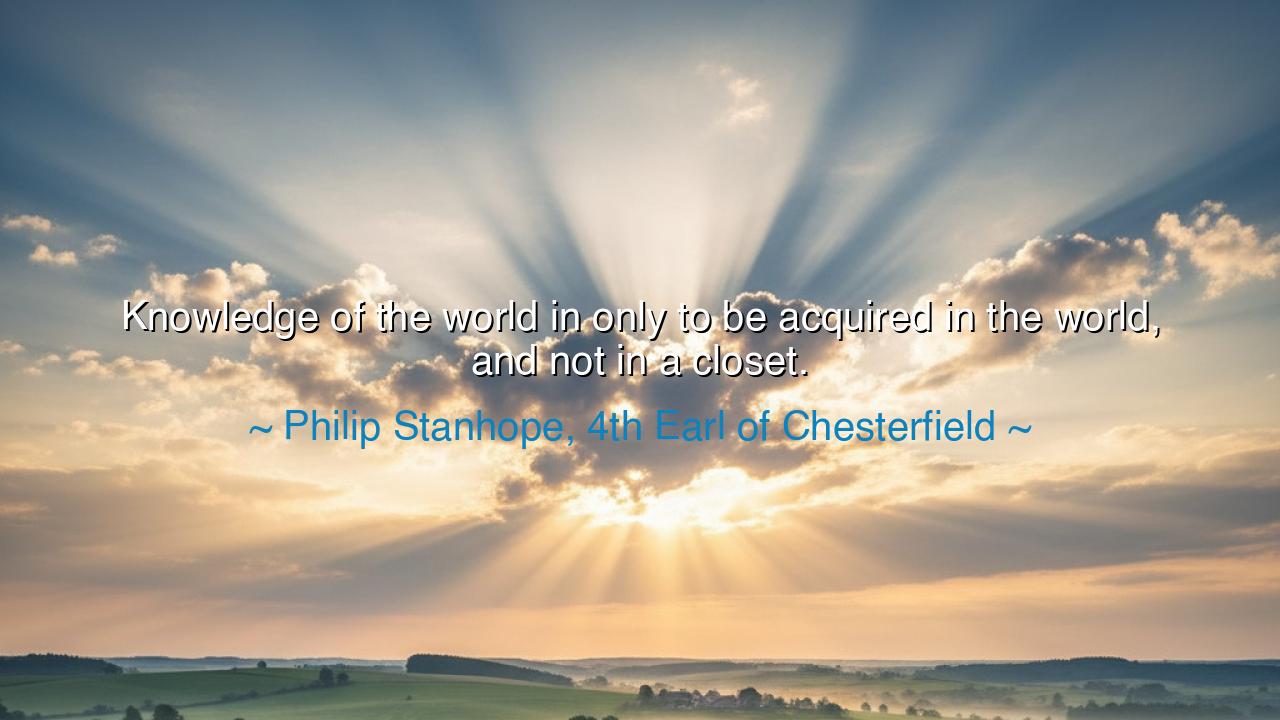
Knowledge of the world in only to be acquired in the world, and






“Knowledge of the world is only to be acquired in the world, and not in a closet.” These words, spoken by Philip Stanhope, the 4th Earl of Chesterfield, resound like an ancient bell calling the soul out of slumber. The Earl, a man of diplomacy and refinement in the 18th century, did not speak of mere learning from books or theories written in ink. No — he spoke of that deeper wisdom that can only be gained through experience, through stepping into the dust and tumult of life itself. His words remind us that the world is the greatest teacher, and the lessons it gives are written not on parchment, but upon the human heart.
For too long, many have mistaken knowledge for wisdom. The one can be gathered in solitude, but the other must be earned in motion, through trial, conversation, and failure. A man may read all the treatises of philosophy and still remain a stranger to life if he fears to walk among men. Chesterfield’s counsel was to his son — yet it speaks to all who seek greatness. He knew that the closet, the chamber of isolation, breeds thought but not understanding. To know the world, one must see it, feel its tempests, and learn the secret pulse of human hearts.
Think of Alexander the Great, who studied under Aristotle, yet found his true education not in the lecture halls of Macedonia, but upon the battlefields of Asia. He learned the measure of courage, the art of mercy, and the frailty of ambition — not from books, but from the cries of men and the dust of conquest. The world was his tutor, and its lessons were carved into his destiny. So too must we step beyond our comfort, for wisdom does not dwell in the silence of the room but in the roar of the living.
The closet is not evil — it is sacred as the place of thought, of reflection. But when one dwells there too long, knowledge becomes stagnant, like water sealed in a jar. True understanding requires the fresh wind of the world, the challenge of differing voices, and the friction of real human experience. To know how men think, one must walk among them. To understand suffering, one must witness it. To grasp love, one must risk heartbreak. Such is the price of living wisdom.
Consider the sailor who learns the sea not by reading its maps, but by standing on the deck, feeling the storm rage against his face. Or the physician who truly understands life not from anatomy charts, but from the trembling hands of those she heals. Every person who has mastered their craft has done so by venturing beyond theory into the realm of living action. The world tests, refines, and perfects knowledge until it becomes truth.
The lesson is clear, my friend: retreat not into the safety of the mind alone. Let thought and action be as two wings of the same bird — for thought without action is sterile, and action without thought is blind. The path to wisdom demands both contemplation and courage. Go forth into the world, speak to its people, feel its rhythms, suffer its storms, and taste its joys. Each experience, whether triumphant or tragic, adds a stone to the temple of understanding within you.
Thus, the teaching of the Earl becomes our inheritance: to live as students of life itself. Read, yes — but then rise, and go out among the living. Seek the knowledge of the world in the world. Listen, observe, strive, fail, and rise again. For it is only through the great, messy, glorious theater of existence that the soul is awakened and the mind made wise. And when at last you return to your chamber — your “closet” — you shall not bring theories alone, but truth, polished by the touch of life itself.






AAdministratorAdministrator
Welcome, honored guests. Please leave a comment, we will respond soon